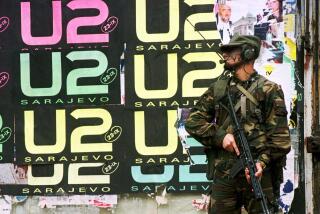In Bosnia, Spring Is the War Season : Balkans: Winter fears of cold and hunger fade. But many worry that rested, rearmed foes are ready for battle.
- Share via
SARAJEVO, Bosnia-Herzegovina — The clear, sunny weather that paid a brief visit to much of Bosnia-Herzegovina earlier this week carried a bittersweet message for the weary citizens of this war-torn land.
In one respect, it was a good sign, a sign that the people of Sarajevo had made it through their third winter of siege, a sign that the gnawing fear of cold and hunger that so many began feeling in the late autumn could now subside.
But there was also an ominous side to this first touch of warmth: It signals an end to the winter lull in fighting and may mean that Bosnia’s fourth year of ethnic slaughter is about to begin in earnest.
“No one wants to predict it, but March and April are battle months,” a seasoned Western diplomat here said. “I fear it’s going to be back to the bad old days.”
Indeed, as the last of the snow recedes on the peaks around the Bosnian capital, the outlook for peace could hardly be worse.
On the diplomatic front, the search for an end to the war has lost its way. The latest in a series of international peace initiatives, a “final” formula pushed by a five-nation Contact Group--made up of Britain, France, the United States, Russia and Germany--is all but dead after being repeatedly rejected by the Bosnian Serbs.
That plan envisioned dividing the country in two, giving the Muslims and their Bosnian Croat allies 51% of the land and the Serbs 49%. The Serbian rebels now hold about 70% of Bosnia.
“If you asked 1,000 people here, not one would vote for that plan,” said Nikola Koljevic, the senior figure in the rebel Serb leadership.
Subsequent attempts to get Serbian President Slobodan Milosevic to undercut his Bosnian Serb brethren by formally recognizing the Bosnian government in return for an easing of tough economic sanctions against his country have failed so far.
Meanwhile, a four-month cease-fire negotiated in December with the help of former President Jimmy Carter is coming under increasing strain, a fact that can only dim hopes for any extension.
“The situation is deteriorating,” U.N. spokesman Gary Coward said here Friday.
*
His comments came on a day that Bosnian Serb snipers, firing into central Sarajevo, wounded two civilian streetcar passengers. A French U.N. peacekeeper was also shot in a separate incident.
Humanitarian aid flights resumed at Sarajevo’s airport Friday, but sniper fire briefly closed the road linking the airport with the city.
Aid flights had been suspended Thursday after a Russian-built transport plane was hit by small-arms fire as it took off.
Other factors add to the gloom.
For example, attempts to explore new diplomatic options to end the crisis in Bosnia have been complicated by events to the north in Croatia. There, President Franjo Tudjman has said he plans to expel the 12,000 U.N. peacekeepers who now keep Croats and Croatian Serbs from killing each other along a 1,000-mile cease-fire line.
Persuading him to change his mind now eclipses Bosnia on the Balkans political agenda. Richard Holbrooke, assistant secretary of state for European affairs, is scheduled to be the latest in a series of high-ranking Western visitors traveling to Zagreb, the Croatian capital, with the goal of changing Tudjman’s mind.
There is also considerable evidence that both sides in the Bosnian war have used the cease-fire to stock their arsenals for a new round of fighting. While the Bosnian government is officially under an international arms embargo, materiel appears to be getting through.
Reports by U.N. officials of supply aircraft landing secretly at the airport in Tuzla at least three times last month indicate that the Bosnian government’s army is getting resupplied despite the embargo.
U.N. officials strongly suggested that Western countries had been directly involved in the operation. “It would be impossible to do this (landing of supplies) without the awareness of the Western powers,” Paul Risley, a spokesman for the U.N. Protection Force, said after the incidents first became public.
Reports of night helicopter movements from Serbia into Serb-held territory in Bosnia suggest that Bosnian Serb forces are also being resupplied for spring fighting.
More to Read
Sign up for Essential California
The most important California stories and recommendations in your inbox every morning.
You may occasionally receive promotional content from the Los Angeles Times.













